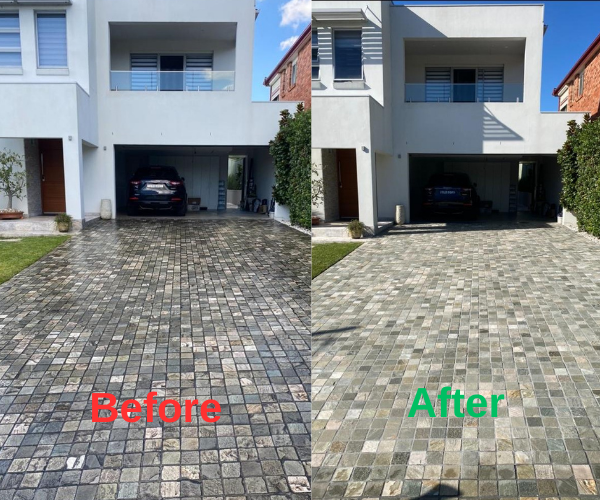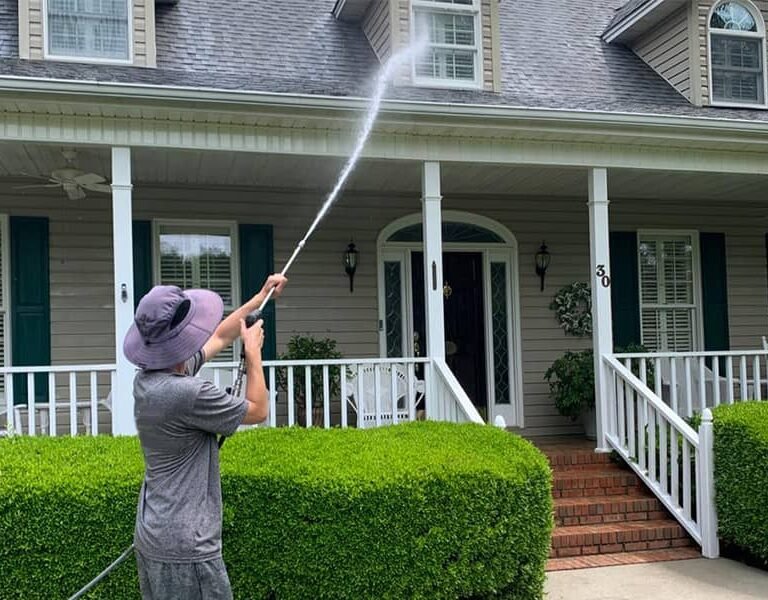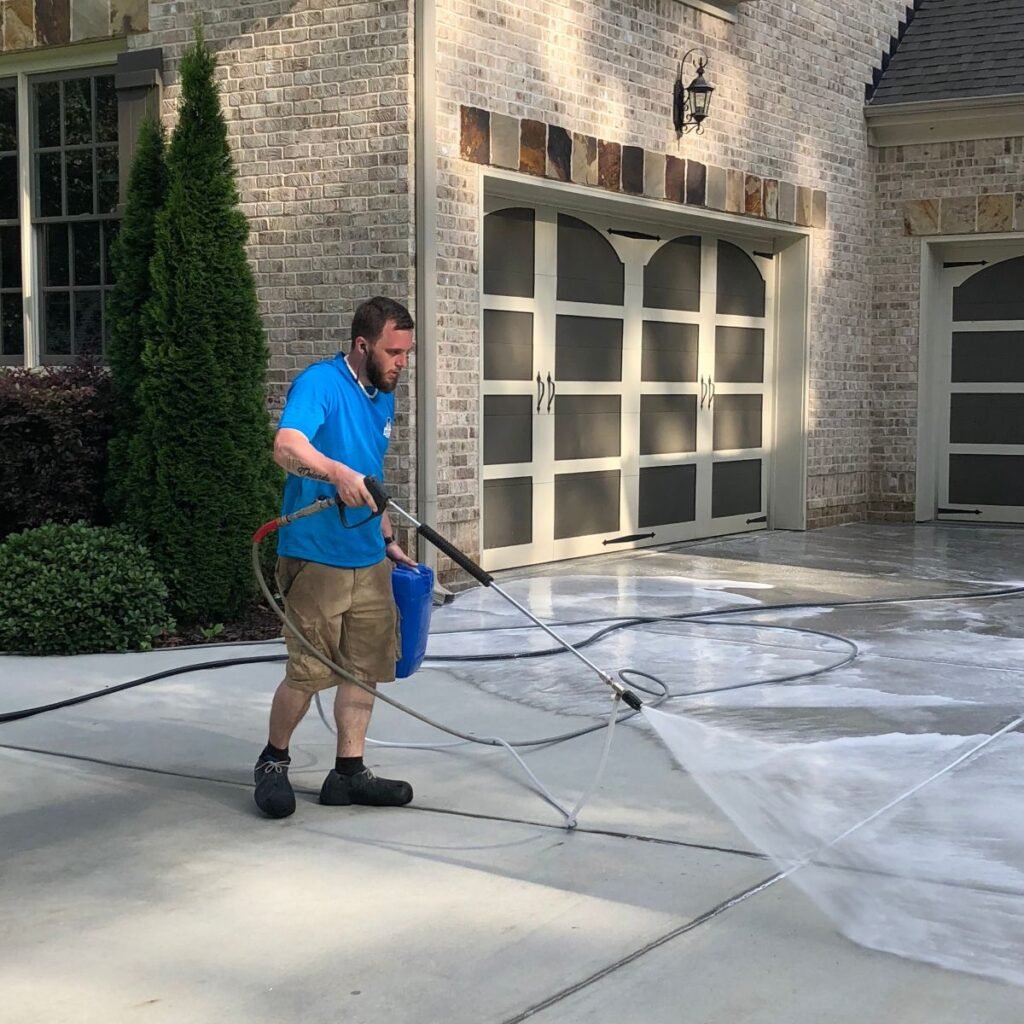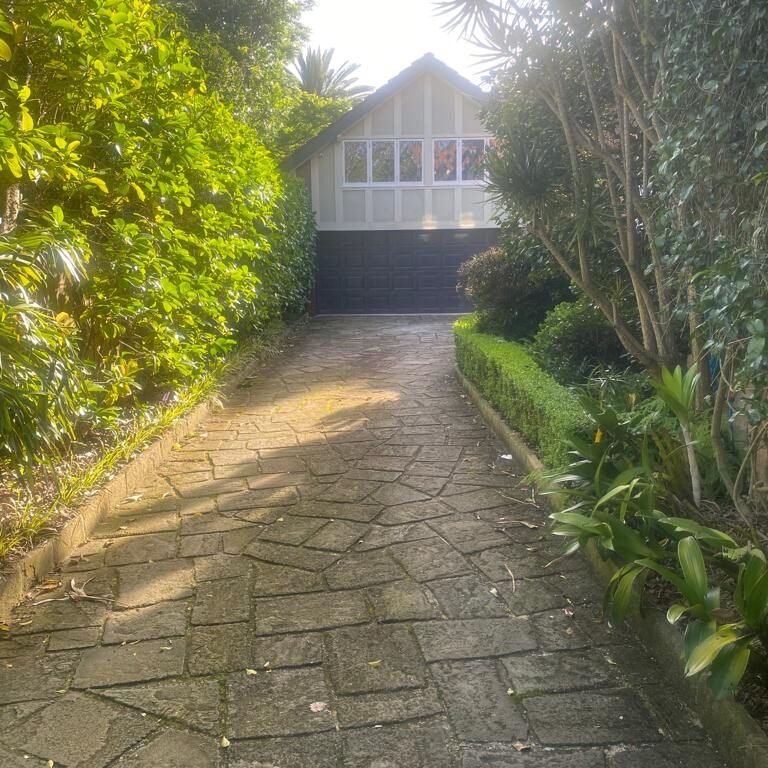The Ultimate Guide to Residential Pressure Washing:
Transforming Your Home with a Sparkling Clean

SS residential pressure washing transforms your dirty exterior into a sparkling oasis. You don’t have to look for any other place to fix your exterior surface. This ultimate guide will walk you through everything you need to know about residential pressure washing and how it can rejuvenate the appearance of your home. From choosing the right pressure washer to understanding the correct techniques for different surfaces, we’ve got you covered.
SS house washing Sydney is dedicated to provide you with the most accurate and up-to-date information. It ensures that you can confidently tackle your pressure washing in Sydney project. Whether you’re planning to clean your siding, deck, driveway, or any other surface, we’ll share our expert tips to achieve best results.
With our step-by-step guidance, you’ll learn how to effectively remove years of dirt, grime, and even mold, all while safeguarding your home’s integrity. Say goodbye to a lackluster exterior and hello to a home that shines with pride. Get ready to transform your residence with the power of residential pressure washing.
Benefits of Residential Pressure Washing
It offers many advantages that can enhance the appearance and longevity of your home. One of the most significant benefits is the immediate aesthetic improvement. Over time, dirt, mold, mildew, and algae accumulate on various surfaces, dulling their appearance and making your home seem neglected. A thorough pressure wash can instantly rejuvenate your home’s exterior. And reveal its original beauty and make it look fresh and inviting. This transformation not only boosts your home’s curb appeal but also increases its overall value. It is particularly important if you’re considering selling your property in the future.
Additionally pressure washing plays a crucial role in maintaining the structural integrity of your home. Accumulated grime and organic growth leads to deterioration of surfaces, particularly wood and concrete. Mold and mildew, if left untreated, penetrates deeper into materials. Which causes rot and other forms of damage that may necessitate costly repairs. By regularly pressure washing your home, you can prevent these issues from developing. Which then saves you money in the long run. This preventive maintenance approach ensures that your home remains in excellent condition and can withstand the elements over the years.

Furthermore, pressure washing is an environmentally friendly cleaning method. Unlike harsh chemical cleaners that can be harmful to the environment, pressure washing primarily uses water and high pressure to remove dirt and contaminants. Many pressure washing services incorporate eco-friendly detergents that are safe for your plants and landscaping. This means you can achieve a sparkling clean home without compromising the health of your surroundings. It’s a win-win situation where you can enjoy a pristine exterior while being mindful of your environmental footprint.
Common Areas to Pressure Wash Around the Home
When it comes to residential pressure washing, there are several key areas that often require attention. One of the most common places homeowners target is the siding of their houses. Over time, siding can accumulate grime, algae, and mildew, especially in shaded areas where moisture lingers. Cleaning the siding not only improves the overall look of your home but also prevents potential damage caused by mold growth. Whether you have vinyl, wood, or aluminum siding, pressure washing can effectively restore its original luster and protect it from further deterioration.

Another area that benefits significantly from pressure washing is driveways and walkways. These surfaces are subjected to constant foot and vehicle traffic, making them prone to stains from oil, tire marks, and spills. Additionally, mold and mildew can develop in damp areas, creating slippery conditions that can pose safety risks. Regular pressure washing of your driveway and walkways not only enhances their appearance but also helps maintain a safe environment for your family and guests. By removing stains and debris, you can ensure that your driveway looks its best and lasts longer.
Decks and patios are also critical areas to consider for pressure washing. Wooden decks, in particular, are susceptible to dirt buildup, mold, and UV damage, which can lead to splintering and deterioration over time. Pressure washing can effectively clean these surfaces, making them safe and visually appealing. For composite decking materials, it’s essential to use the correct pressure settings to avoid causing damage. By regularly maintaining your deck or patio through pressure washing, you can extend its lifespan and create a welcoming outdoor space for relaxation and entertainment.
Choosing the Right Pressure Washer for Your Needs
Selecting the appropriate pressure washer is vital for achieving effective and safe cleaning results. There are two primary types of pressure washers: electric and gas-powered. Electric pressure washers are generally ideal for light to moderate cleaning tasks, such as washing cars, patio furniture, and small decks. They are quieter, lighter, and easier to maintain, making them a great choice for homeowners who need a machine for occasional use. On the other hand, gas-powered pressure washers are more powerful and suited for heavy-duty tasks, including cleaning large driveways, siding, and decks with stubborn stains. These machines are typically more portable but require more maintenance and are louder during operation.
When choosing a pressure washer, consider the PSI (pounds per square inch) and GPM (gallons per minute) ratings. The PSI indicates the water pressure, while the GPM measures the water flow. For most residential tasks, a pressure washer with a PSI between 1,500 and 3,000 is adequate. The higher the PSI, the more powerful the cleaning capability, but be cautious as excessive pressure can damage delicate surfaces. Additionally, the GPM rating affects how quickly you can clean an area; a higher GPM means more water is being used, resulting in faster cleaning.

Another factor to consider is the availability of various nozzles and attachments. Many pressure washers come with interchangeable nozzles that allow you to adjust the spray pattern and pressure, which is essential when cleaning different surfaces. For example, a 0-degree nozzle provides a concentrated stream for tough stains, while a 40-degree nozzle disperses water for broader cleaning tasks. Some machines also offer detergent tanks or foam cannons, which can enhance the cleaning process for stubborn stains. By carefully considering these factors, you can choose the right pressure washer that fits your specific cleaning needs.
Safety Tips for Residential Pressure Washing
While pressure washing can be a highly effective cleaning method, it is essential to prioritize safety during the process. One of the most critical safety tips is to wear appropriate personal protective equipment (PPE). This includes safety goggles to protect your eyes from debris and splashes, gloves to safeguard your hands from chemicals and sharp objects, and closed-toe footwear to prevent slips and injuries. Depending on the pressure and type of surface you are cleaning, you may also wish to wear long sleeves and pants to shield your skin from any potential injuries.
Before starting your pressure washing project, it’s vital to assess the area you’ll be working on. Remove any obstacles such as furniture, potted plants, or decorations that could get in the way or be damaged during the cleaning process. Additionally, check for any low-hanging electrical wires or fixtures that may pose a hazard when using a pressure washer. Make sure to cover any electrical outlets and seals to prevent water from entering, which can cause serious electrical issues. Being aware of your surroundings will help prevent accidents and ensure a safer working environment.
Another important safety consideration is to understand the pressure settings and techniques for the surfaces you are cleaning. Using too high of a pressure setting can lead to damage, especially on softer materials like wood or painted surfaces. Always start with the lowest pressure setting when working on a new surface and gradually increase it only if necessary. Maintain a safe distance from the surface to avoid causing damage and always follow the manufacturer’s guidelines for the pressure washer you are using. By adhering to these safety tips and practices, you can enjoy a successful pressure washing experience without compromising your safety or the integrity of your home.
Step-by-Step Guide to Pressure Washing Your Home's Exterior

Embarking on a pressure washing project can be an exhilarating experience, but it’s essential to follow a structured approach to achieve the best results. Start by preparing the area you intend to clean. This involves clearing away any obstacles, such as furniture, planters, or decorations, to ensure that you have a clear workspace. Next, inspect the surfaces for any damage or loose paint that might be exacerbated by the high-pressure water. It’s wise to address any repairs before proceeding with pressure washing, as this will help avoid further damage during cleaning.
Once the area is prepared, gather your equipment and materials. Make sure your pressure washer is in good working condition and that you have the appropriate nozzles for the job. If you will be using detergent, prepare it according to the manufacturer’s instructions. Attach the appropriate nozzle to your pressure washer, start the machine, and allow it to build up pressure. Always begin washing from the top of the surface and work your way down, as this will help prevent streaking and ensure that dirt flows downwards and away from the cleaned areas.
As you begin pressure washing, maintain a consistent distance between the nozzle and the surface being cleaned. A distance of 12 to 24 inches is typically ideal, but this may vary depending on the surface type and pressure setting. Use sweeping motions to cover large areas, and be cautious around edges, windows, and doors to avoid causing damage. If you encounter stubborn stains, you may need to pause and apply detergent, allowing it to sit for a few minutes to break down the grime before rinsing it away. After you have finished washing, take the time to inspect your work and touch up any areas that may require additional cleaning.
Cleaning and Maintaining Your Pressure Washer
Proper cleaning and maintenance of your pressure washer are essential for ensuring its longevity and optimal performance. After each use, it’s crucial to clean the machine thoroughly. Start by turning off the pressure washer and disconnecting the water supply. Release any remaining pressure by squeezing the trigger on the spray gun. Once the pressure is released, remove the nozzle and rinse it with water to prevent clogs. Additionally, make sure to clean the filter and check for any debris that may have accumulated during use. This simple step helps maintain the efficiency of your machine.
Regular maintenance also involves checking the oil levels for gas-powered pressure washers. If your model requires oil, ensure that it is at the recommended level and change it according to the manufacturer’s guidelines. Inspect the hoses for any signs of wear or leaks. If you notice any damage, it is crucial to replace the hoses to prevent further issues during operation. Additionally, store your pressure washer in a clean, dry place, preferably indoors, to protect it from environmental factors that could lead to rust or damage.
Another important aspect of pressure washer maintenance is winterizing the machine if you live in a colder climate. Before the first freeze, ensure that you have drained all water from the pump and hoses to prevent freezing and damage. You may also consider running a pump saver or antifreeze solution through the machine to protect it during the winter months. By adhering to these cleaning and maintenance tips, you can extend the life of your pressure washer and ensure that it remains a reliable tool for your residential cleaning projects.
Hiring a Professional Pressure Washing Service
While many homeowners opt to tackle pressure washing projects themselves, there are instances when hiring a professional service is the best choice. One of the primary benefits of hiring experts is their experience and expertise in handling various surfaces and cleaning challenges. Professionals are well-trained in using pressure washers and have the knowledge to determine the right pressure settings and techniques for different materials. This expertise helps prevent damage to your home and ensures that the job is completed efficiently and effectively.
Additionally, hiring a professional service saves you valuable time and effort. Pressure washing can be a labor-intensive task, especially for larger homes or heavily soiled areas. Professionals have access to high-quality equipment and can complete the job in a fraction of the time it would take an inexperienced homeowner. This allows you to focus on other important tasks or simply enjoy your free time without the hassle of cleaning your home’s exterior.
Another advantage of professional pressure washing services is the peace of mind that comes from knowing the job will be done correctly. Many reputable companies offer guarantees for their work, providing you with added security in case any issues arise after the job is completed. Additionally, professionals often utilize eco-friendly cleaning solutions that are safe for your home and the environment. By choosing to hire experts, you can enjoy the benefits of a sparkling clean home without the stress and physical demands of doing it yourself.

Troubleshooting Common Residential Pressure Washing Issues

Even with the best equipment and techniques, issues can occasionally arise during pressure washing projects. One common problem is streaking, which can occur if the pressure washer is not used correctly or if the cleaning solution is not rinsed away thoroughly. To avoid streaks, always wash from the top down and use proper techniques to ensure even coverage. If you notice streaks after washing, you may need to go over the area again with a lower pressure setting and a clean water rinse to remove any lingering detergent or dirt.
Another issue homeowners may encounter is inconsistent water pressure. This can be caused by a clogged nozzle, a kinked hose, or a problem with the pressure washer itself. If you experience low pressure, inspect the nozzle for clogs and clean it accordingly. Check the hoses for any bends or kinks that may be restricting water flow. If these steps do not resolve the issue, consult the manufacturer’s guidelines or a professional for further assistance.
Lastly, homeowners may find themselves dealing with stubborn stains that don’t respond well to pressure washing. In such cases, it may be helpful to pre-treat the stain with a specialized cleaning solution designed for the specific type of stain you’re dealing with, such as rust, grease, or mold. Allow the solution to sit for the recommended time before pressure washing again. If the stain persists after treatment, it may require more advanced cleaning techniques or professional assistance to fully remove it.
Enjoy a Sparkling Clean Home with us
Residential pressure washing is an invaluable method for keeping your home looking its best while preserving its structural integrity. The benefits of pressure washing extend beyond mere aesthetics. It encompasses maintenance, safety, and environmental considerations. By understanding the common areas that require attention, choosing the right equipment, and following safety guidelines, homeowners can successfully tackle their pressure washing projects with confidence.
So, roll up your sleeves, gather your tools, and get ready to unleash the transformative power of SS residential pressure washing. With the right approach and techniques, you can enjoy a beautifully refreshed home that stands out in your neighborhood. Say goodbye to grime and hello to the joy of a sparkling clean living space, making your home a true reflection of your care and attention.

Add a Comment